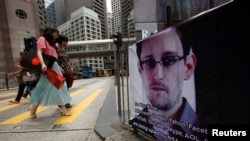The United States pressured Hong Kong on Saturday to act quickly on its request to extradite Edward Snowden, a former U.S. National Security Agency contractor charged with espionage for exposing secret U.S. surveillance activities.
"If Hong Kong doesn't act soon, it will complicate our bilateral relations and raise questions about Hong Kong's commitment to the rule of law,'' a senior Obama administration official told Reuters, speaking on condition of anonymity.
Sources say Snowden, who has been hiding in Hong Kong, has sought legal representation from human rights lawyers as he prepares to fight attempts to force him back to the United States to face trial.
U.S. National Security Adviser Tom Donilon told CBS News the United States had a "good case'' against Snowden and expected Hong Kong to comply with its 1998 extradition treaty with the United States.
"We have gone to the Hong Kong authorities seeking extradition of Snowden back to the United States,'' Donilon said.
He added that U.S. law enforcement officials were in a "conversation'' with Hong Kong authorities about the issue.
"Hong Kong has been a historically good partner of the United States in law enforcement matters and we expect them to comply with the treaty in this case,'' Donilon said.
A senior U.S. law enforcement source said extradition "can, of course, be a lengthy legal process'' but expressed optimism that Snowden would be extradited.
The South China Morning Post said on Saturday that Snowden was not detained or in police protection - as reported elsewhere - and instead was in a "safe place'' somewhere in Hong Kong.
The paper also quoted Snowden offering new details about U.S. spy activities, including accusations of U.S. hacking of Chinese mobile phone companies.
"The NSA does all kinds of things like hack Chinese cellphone companies to steal all of your SMS (texting) data,'' Snowden was quoted by the Post as saying during a June 12 interview.
Documents previously leaked by Snowden revealed that the NSA has access to vast amounts of internet data such as emails, chat rooms and video from large companies such as Facebook and Google, under a government program known as Prism.
They also showed that the government had worked through the secret Foreign Intelligence Surveillance Court to gather so-called metadata - such as the time, duration and telephone numbers called - on all calls carried by service providers such as Verizon.
On Friday, the Guardian newspaper, citing documents shared by Snowden, said Britain's spy agency GCHQ had tapped fiber-optic cables that carry international phone and internet traffic and is sharing vast quantities of personal information with the NSA.
Espionage charges
The United States charged Snowden with theft of government property, unauthorized communication of national defense information and willful communication of classified communications intelligence to an unauthorized person, according to the criminal complaint made public on Friday.
The latter two offenses fall under the U.S. Espionage Act and carry penalties of up to 10 years in prison.
Scores of Americans have been sent back home from Hong Kong to face trial under the extradition treaty. But the process can take years, lawyers say, and Snowden's case could be particularly complex.
America's use of the Espionage Act against Snowden has fueled debate among legal experts about whether that could complicate his extradition, since the treaty includes an exception for political offenses and Hong Kong courts may choose to shield him from prosecution.
Snowden says he leaked the details of the classified U.S. surveillance to expose abusive and illegal programs that trampled on citizens' privacy rights.
President Barack Obama and his intelligence chiefs have vigorously defended the programs, saying they are regulated by law and that Congress was notified. They say the programs have been used to thwart militant plots and do not target Americans' personal lives.
Stephen Vladeck, a professor at American University's Washington College of Law who studies national security issues, said there is no clear definition of what constitutes a political offense under the treaty.
"My intuition says it'll be easier for Snowden to argue espionage is a political offense than (the U.S. charge of) theft of government property,'' Vladeck said.
The South China Morning Post reported on Saturday that Snowden said he had documents showing NSA had hacked major Chinese telecoms companies to access text messages and targeted China's top Tsinghua University.
The NSA program also hacked the Hong Kong headquarters of Pacnet, which has an extensive fiber-optic network, the paper said.






